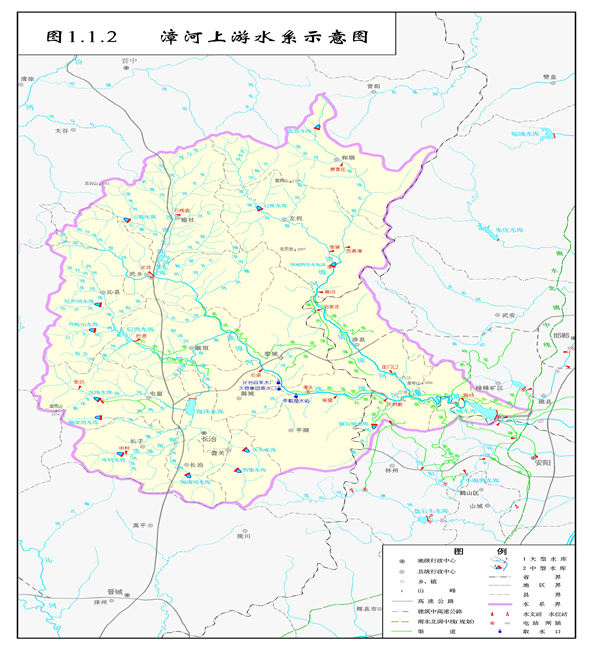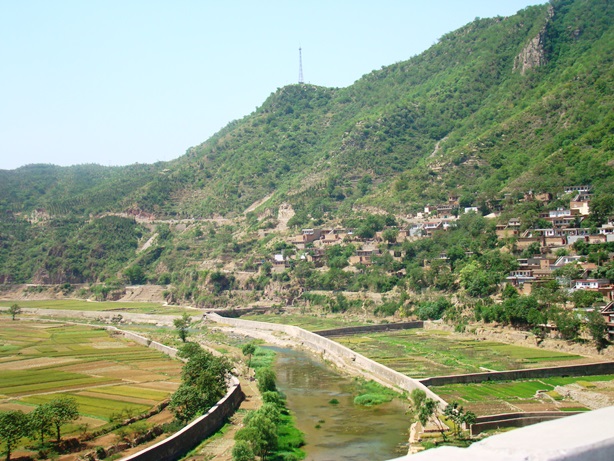Zhang River runs through Shanxi Province, Hebei Province and Henan Province as the border of Hebei and Henan Provinces.

Within the basin, there is a large population but inadequate water and land resources. The residents of the villages along the river only have a small amount of valley terraces and flood land barely meeting their survival demand. The area of arable land per capita in Shanxi, Hebei and Henan was respectively 0.13 ha, 0.07 ha and 0.06 ha and the effective irrigation area per capita only 0.02 ha, 0.03 ha and 0.04 ha. The water disputes of Zhang River were triggered in the 1950s owing to the limited natural resources, mainly on the Zhuozhang River, the Qingzhang River and the main stream of the Zhang River in the border area of Shanxi, Hebei and Henan. The number of destructive incidents of water projects in Hongqi Canal of Henan Province, Dayuefeng Canal of Hebei Province and Baishan Canal of Hebei was over 30. The residents of villages on both sides of Zhuozhang River from Hebei Province and Henan Province shelled each other and fought with weapons. The conflicts caused casualties and significant economic loss and directly affected the local social stability and economic development. The Zhang River region was one of the worst regions that had been suffered by the greatest water conflicts.
The problems could be summarized into several points. First, the upper reaches of Zhang River were short of land and water resources that led to obvious contradiction between supply and demand. Second, there was a blank of the integrated management and planning of related authorities, resulting in unregulated exploitations and contradictions difficult to coordinate. Third, the residents on both sides competed to build field-and-village-protecting dams and hydroelectric power projects for occupying river banks.
Due to the particularity of the basin and its influence in China, the Central Government has attached importance to water disputes of Zhang River, issuing documents and guidance to the provincial governments of Henan and Hebei Provinces for settling disputes and achieving social stability. On June 3, 1989, the State Council approved "the Water Allocation Plan of Zhang River" proposed by the Ministry of Water Resources, providing that the water distribution ratio of Zhang River to Henan and Hebei were 48% and 52%, respectively.
In 1992, Ministry of Water Resources coordinated the two provinces to sign "the Agreement on the Settlement of the Water Disputes of Zhang River". While the main channel of the Red Flag Canal was blown up in August, 1992, the State Council held a meeting to mediate the water disputes of the Zhang River, and meanwhile, "the State Council's Coordination Meeting Minutes of the Water Disputes of Zhang River" (State Council [1992] No. 132) was proposed. It was decided to establish the Zhang River Administration affiliated to Haihe River Water Conservancy Commission, the Ministry of Water Resources (hereinafter referred as the Administration), in charge of the reaches up to 108.44 km, covering the lower reaches of Houbi Hydrometric Station of Zhuozhang River, the lower reaches of Kuangmenkou Hydrometric Station of the Qingzhang River and the upper reaches of Guangtai Hydrometric Station of the main channel of the Zhang River, where there were the most severe water disputes. In 1993, the Administration was formally founded, actively developing management mechanisms to solve water disputes between the provinces that resulted in effective outcomes in transboundary river management.
Through 20 years' efforts, with the implementation of a series of measures, the raising legal awareness among the stakeholders along the river and improvement of the comprehensive coordination mechanism, at present, the conflicts between two sides of the upper reaches of Zhang River has mitigated and the direct water disputes and violent conflicts between residents along the river from Hebei Province and Henan Province have been reduced, which meant that a stable order of water affair has been established in the villages of the neighboring provinces along the river.
Full case analysis can be read or downloaded from GWP Toolbox here
